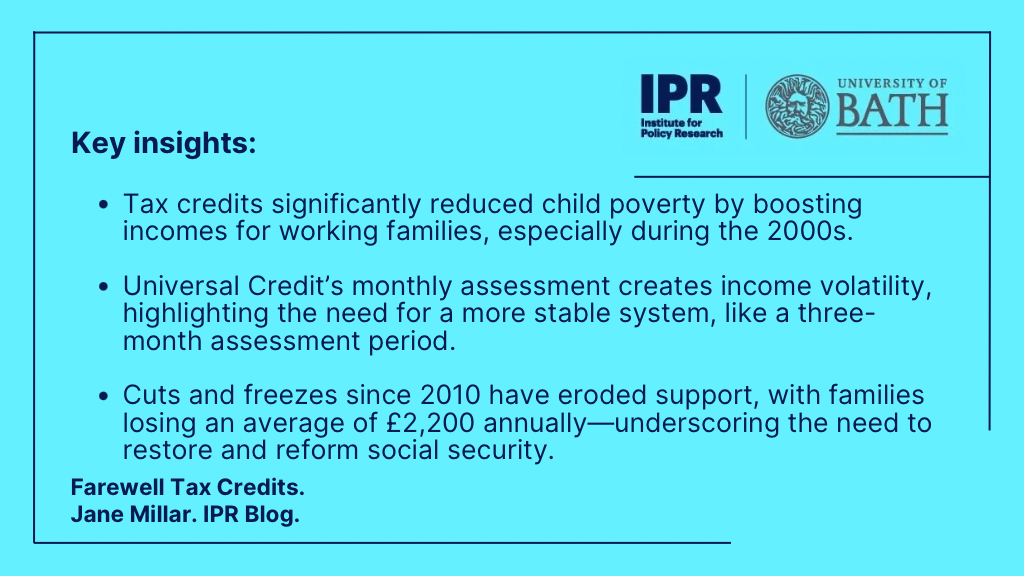 Tax credits officially ended on April 5th, quietly closing a chapter in UK social policy. Introduced in 2003, they were central to Labour’s efforts to reduce child poverty and make work pay. As another Labour government looks ahead, it’s time to reflect on what tax credits achieved—and what lessons we must carry forward.
Tax credits officially ended on April 5th, quietly closing a chapter in UK social policy. Introduced in 2003, they were central to Labour’s efforts to reduce child poverty and make work pay. As another Labour government looks ahead, it’s time to reflect on what tax credits achieved—and what lessons we must carry forward.
Jane Millar, OBE, FBA, FAcSS is Professor Emerita in the Institute for Policy Research at the University of Bath. Her research interests include the design, implementation and impact of family policy, social security and employment policy.
Farewell tax credits! It does not seem right to let tax credits - which closed on April 5th – to slip away unnoticed and unrecognised. Introduced in 2003, the Working Tax Credit (for people in work) and the Child Tax Credit (for families with children) were flagship measuresin New Labour’s commitments to make work pay and to reduce child poverty. After 22 years, and with another Labour government looking for reforms, what lessons might we learn?
First, the current government is committed to tackling child poverty. Social security is one of the main planks in the their promised child poverty strategy. An assessment in 2013 of Labour’s record on inequality and poverty highlighted significant falls in poverty, and especially in child poverty, and attributed this mainly to the tax and benefit reforms, including tax credits. These were key to the fall in poverty rates for families And that money was spent on children, improving their lives and living standards. Wages and increased employment do reduce poverty risks, but there are many families with one parent, sometimes two, in work who are still below the poverty line. And not everyone can work. Cash transfers will always be needed to prevent or alleviate poverty.
Tax credits provided a boost to income for many but did not escape the austerity years, with various elements frozen in value and other cuts also imposed, including the two-child limit introduced from 2017. Families with children have lost out significantly. Estimates show that among the 7.6 million households with children, changes to the tax and benefit system have reduced benefit entitlements by £2,200 per year on average since 2010. Some catching up is needed simply to restore that lost support.
Second, the current government has Universal Credit under review, including looking at assessment and payments periods. Tax credits were based on annual assessment and were heavily criticised for the issue of overpayments and the impact of paying these back on claimants. This was one of the arguments made for Universal Credit – that monthlyassessment and payment would mean that there would be no build-up of overpayments. Butin practice the monthly cycle has proven challenging for many claimants and not well aligned with the ways in which income varies over time.
There is now growing evidence on the extent and impact of earnings and income volatility, affecting in particular the low-paid and those with least protection in the labour market. The monthly assessment in Universal Credit adds to the volatility, and to the challenges of copingwith income fluctuations. Something between the annual tax credit award and the monthly tax credits award would help to stabilise incomes and provide a firmer foundation for people to manage their money. Three months, as suggested by the House Of Lords Economic Affairs Committee, would help to stabilise incomes and remove some stress and uncertainty from claimants. Claimants could report falls in income, which would protect people if they lost their jobs or significantly reduced hours of work. But increases in income could be disregarded in the award period, giving people a short-term income boost and reducing volatility.
Many people, parents and children, benefited financially from tax credits. We need to rebuild our social security and tax systems to deliver fair and equitable redistribution of financial support and contribution. Tax credits may not be part of that future, but we should not forget the contribution they made.
All articles posted on this blog give the views of the author(s), and not the position of the IPR, nor of the University of Bath.
Respond




